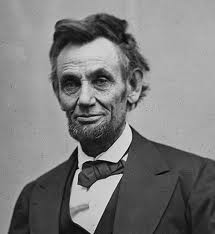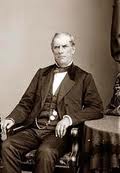 Lincoln’s Prince of Patronage, was a master of machine politics and New York’s political boss of bosses. Prior to Abraham Lincoln’s election in 1860, many of the candidate’s advisors knew that in order to win, Lincoln would have to romance the eastern media and power brokers, which mostly were one in the same. The future President, with his western wit and backwoods tales, was not accustomed to the political intrigues, deals and patronage of big city politics. Lincoln relied on his supporters, friends and other legal associates to guide and advise him on his Presidential adventure. Among these early counselors were, Leonard Swett, Elihu Washburne, David Davis and Ward Hill Lamon. These prominent and trusted Lincoln stalwarts and many others, assured Lincoln the ability to navigate the treacherous terrain of his election and journey to Washington. However, nothing could prepare President Lincoln for the trials and turmoil of the legions of power-hungry political operatives, that sought compensation for their election support.
Lincoln’s Prince of Patronage, was a master of machine politics and New York’s political boss of bosses. Prior to Abraham Lincoln’s election in 1860, many of the candidate’s advisors knew that in order to win, Lincoln would have to romance the eastern media and power brokers, which mostly were one in the same. The future President, with his western wit and backwoods tales, was not accustomed to the political intrigues, deals and patronage of big city politics. Lincoln relied on his supporters, friends and other legal associates to guide and advise him on his Presidential adventure. Among these early counselors were, Leonard Swett, Elihu Washburne, David Davis and Ward Hill Lamon. These prominent and trusted Lincoln stalwarts and many others, assured Lincoln the ability to navigate the treacherous terrain of his election and journey to Washington. However, nothing could prepare President Lincoln for the trials and turmoil of the legions of power-hungry political operatives, that sought compensation for their election support.
Thurlow Weed, born in 1797, at Cairo, New York, was raised on a farm and had little if any formal education. Weed apprenticed as a black smith and entered his teens setting type for an Albany, New York newspaper. He developed an interest in politics and realized that the press was a strong political tool, that could influence public opinion. Weed was an early supporter of John Quincy Adams run for President and was elected himself to the State Legislature, where he befriended William H. Seward. In 1825, Thurlow Weed bought the Rochester Telegraph and then purchased the Enquirer, becoming a staunch member of the Anti-Masonic movement in New York State. Weed and his Whig allies absorbed the Masonic faction and solidified their political base in New York.
 Weed was elected to the Assembly again in 1829, but more significantly, he was able to establish the Albany Evening Journal, the first issue of which appeared in February 1830. Weed was its editor and political manager. He also organized the newly formed Whig party and was instrumental in creating the Whig victories in the New York gubernatorial election of Seward, in 1838 and William Henry Harrison’s presidential campaign of 1840. He achieved an extensive reputation as a political manager and manipulator, using patronage, favors, and the press on behalf of the Whig party. Generally operating behind the scenes, he was closely identified with his personal and political friend, William H. Seward.
Weed was elected to the Assembly again in 1829, but more significantly, he was able to establish the Albany Evening Journal, the first issue of which appeared in February 1830. Weed was its editor and political manager. He also organized the newly formed Whig party and was instrumental in creating the Whig victories in the New York gubernatorial election of Seward, in 1838 and William Henry Harrison’s presidential campaign of 1840. He achieved an extensive reputation as a political manager and manipulator, using patronage, favors, and the press on behalf of the Whig party. Generally operating behind the scenes, he was closely identified with his personal and political friend, William H. Seward.
Thurlow Weed had a knack for gauging the political winds and when Zachary Taylor died in office and Millard Fillmore gained the Presidential reins, Weed left the country, enjoying an extended stay in Europe. He returned and found the Kansas-Nebraska Act in full contention, the Republican movement gaining momentum, he threw his support behind Seward for President in the 1860 election.
The political machine of the New York Whigs, had a negative impact on the mindset of the new Republican Party and since the Democrats were split, a close election was in the offing. Weed pressed for the nomination of Seward as the party’s candidate in 1860, but
his ambitions for Seward were dashed. Ironically, Weed’s own reputation as a political boss damaged Seward’s chances at the Republican party’s national convention in Chicago. Lincoln acknowledged Weed’s political acumen by consulting with him during the campaign of 1860. And following the election, Weed advised Lincoln on patronage and undertook an unofficial diplomatic mission to Europe. However, his conservative views on emancipation and other issues brought a steady decline in his influence.
Lincoln tried to pacify Weed by careful attention to the distribution of patronage in New York. He blocked Secretary of the Treasury Salmon P. Chase, when he tried to appoint a new assistant secretary of the treasury for New York who was opposed by Weed and his cronies. President Lincoln continued his political pacification program in New York when he arranged the removal of Collector of the Port of New York, Hiram Barney, and replaced him with Simeon Draper, one of Weed’s influential friends.
The President was growing weary of the New York influence peddler and his constant harangues regarding administration policy and appointments. The relationship reached its breaking point prior to the 1864 Presidential election when Thurlow Weed and his minions believed that Lincoln’s Emancipation Proclamation spelled doom for the Union and the Republican Party at large. Lincoln didn’t burn any bridges with Weed, replying to a congratulatory telegram on his inaugural address,
“Every one likes a compliment. Thank you for yours on my little notification
speech, and on the recent Inaugural Address. I expect the latter to wear
as well as — perhaps better than—any thing I have produced; but I believe it is
not immediately popular. Men are not flattered by being shown that there has
been a difference of purpose between the Almighty and them. To deny it, however,
in this case, is to deny that there is a God governing the world. It is a truth
which I thought needed to be told; and as whatever of humiliation there is in
it, falls most directly on myself, I thought others might afford for me to tell
it.”
After Lincoln’s assassination, Weed backed Andrew Johnson’s reconstruction policies and all but destroyed any future in personal power, prestige or politics. Lincoln’s Prince of Patronage and any future as a New York Political Boss would be ruined by choosing poorly and supporting the biggest Presidential Loser of all time.
Bummer


Great Site with some excellent write-ups and analysis about the Civil War era. Many of these characters in the Lincoln administration, Seward, Chase, Stanton, etc were beholden to NY Wall Street Bankers, much like today. Like another American President one hundred years later, the Chief Executive tried to chart his own course and found himself at odds with powerful factions of the Financial Establishment. Your excellent post here http://www.civilwarbummer.com/lincolns-assassination-mystery-or-stantons-secret-agents/ naturally brought out the shills (see the imbecile comments of “Richard Sloan” for example). It is expected to receive substantial flack when one is “over the target” so to speak. No doubt there are those who eschew any critical thinking and prefer to accept prepared narratives and official propaganda at face value. For astute students of History however, understanding the true, actual events of 150 years ago holds just as much relevance today as it did then.
Paul, thanks for the read and your astute observations. Bummer’s take on most politics and business intrigues is to “Follow the Money”…..
Sincerely, Bummer
I’d like to read that recent biography of Seward; maybe it would tell how he dealt with the growing divide between his boss and his friend.
Louis,
Will check that out, this student needs to finish what is already begun, have enough trouble keeping Chase and Seward straight as it is. Weed was a character to say the least. With all his political savvy, don’t understand his hooking up with Johnson. Senility?
Bummer